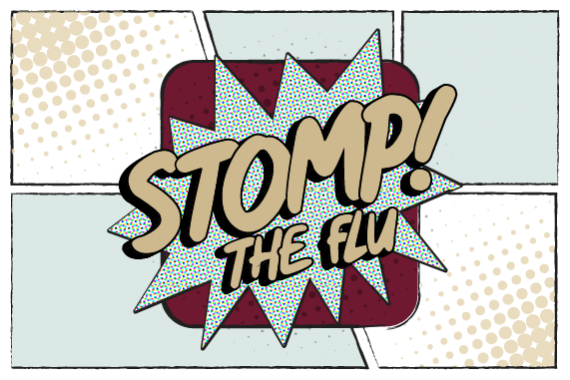Flu Events on Campus
*Additional event dates will be added throughout the season. If you are unable to attend an on-campus event, flu shots are available at University Health Services Monday–Friday. You may schedule by phone, online, or in person.
| Dates | Event Name | Location | Time |
|---|---|---|---|
| Oct. 1 | Stomp the Flu | Landis Green | 10 a.m. - 1 p.m. |
| Oct. 8 | College of Law Wellness Event | College of Law | 12 - 1:30 p.m. |
| Oct. 14 | Fall into Wellness | UHS Courtyard | 11:30 a.m. - 12:30 p.m. |
| Oct. 22 | Flu-Ber | College of Medicine | 11 a.m. -1 p.m. |
| Oct. 24 | Women's Health Day | Landis Green | 10 a.m. - 2 p.m. |
| Nov. 12 | UHS | UHS 1st Floor | 10 a.m. - 1 p.m. |
| Nov. 13 | Stay Safe Fair | Union Green | 11 a.m. - 1 p.m. |
| Dec. 4 | UHS | UHS 1st Floor | 10 a.m. - 12 p.m. |
| Jan. 13-15 | UHS | UHS 4th Floor (See appointment scheduling to be placed in an appointment) | 10 a.m. - 1:30 p.m. |
| Jan. 20-22 | UHS | UHS 4th Floor (See appointment scheduling to be placed in an appointment) | 10 a.m. - 1:30 p.m. |
| Feb. 5 | UHS | UHS 1st Floor | 11 a.m. -1 p.m. |
| Feb. 6 | UHS | UHS 2nd Floor | 11:30 a.m. - 1 p.m. |
Flu shots are now available!
Yearly flu shots are recommended for everyone but are especially indicated for anyone with asthma, chronic heart or lung disease, diabetes, or other health problems that compromise the ability to fight infections.
Flu Vaccines – Each fall we offer flu vaccine at no cost to students in order to protect them against influenza.
Why get vaccinated? – Influenza (“flu”) is a contagious disease that spreads every winter, usually between October and May. It is caused by influenza viruses and is spread mainly by coughing, sneezing, and close contact. The flu vaccine is the best protection against the flu and its complications. The vaccine also helps prevent spreading flu from person to person. UHS gives an injectable flu vaccine, which is either an “inactivated” or recombinant” vaccine. These vaccines do not contain any live influenza virus. It takes about 2 weeks for protection to develop after the vaccination, and protection last several months to a year.
FLU: What to Do if You Get Sick
Information courtesy of the Centers for Disease Control and Prevention
Most people with the flu have mild illness and do not need medical care or antiviral drugs. If you get sick with flu symptoms, in most cases, you should stay home and avoid contact with other people except to get medical care.
If, however, you have symptoms of flu and are in a high risk group, or are very sick or worried about your illness, contact your health care provider.
Certain people are at high risk of serious flu-related complications (including young children, people 65 and older, pregnant women and people with certain medical conditions) and this is true both for seasonal flu and novel flu virus infections. If you are in a high risk group and develop flu symptoms, it’s best for you to contact your doctor. Remind them about your high risk status for flu.
Health care providers will determine whether influenza testing and treatment are needed. Your doctor may prescribe antiviral drugs that can treat the flu. These drugs work better for treatment the sooner they are started.
Are there medicines to treat the flu?
Yes. There are drugs your doctor may prescribe for treating the flu called “antivirals.” These drugs can make you better faster and may also prevent serious complications.
How long should I stay home if I’m sick?
CDC recommends that you stay home for at least 24 hours after your fever is gone except to get medical care or other necessities. Your fever should be gone without the use of a fever-reducing medicine. You should stay home from work, school, travel, shopping, social events, and public gatherings.
What should I do while I’m sick?
Stay away from others as much as possible to keep from infecting them. If you must leave home, for example to get medical care, wear a facemask if you have one, or cover coughs and sneezes with a tissue. Wash your hands often to keep from spreading flu to others. Visit the Taking Care of a Sick Person in Your Home guide for more information.
Cold vs. Flu
A cold and the flu (influenza) are different illnesses. Visit the link below today to make sure you know the difference.
https://www.cdc.gov/flu/about/coldflu.html
How do I get the Flu Vaccine?
- Call (850) 644-4567 to schedule your appointment, walk in, or schedule online if you are an established patient through the patient portal
- Visit one of our on-campus outreach events listed above.
- FSU students will need to present their FSU Card and Insurance Card to receive their no cost flu shot.
- You can also find a location to get a vaccine with the HealthMap Vaccine Finder
Refer to the table above for our on-campus outreach events:
For the safety of other students and staff, please do not schedule your flu shot if you are having any COVID-19 related symptoms. If you are sick, wait until you are symptom free to receive a flu shot.

